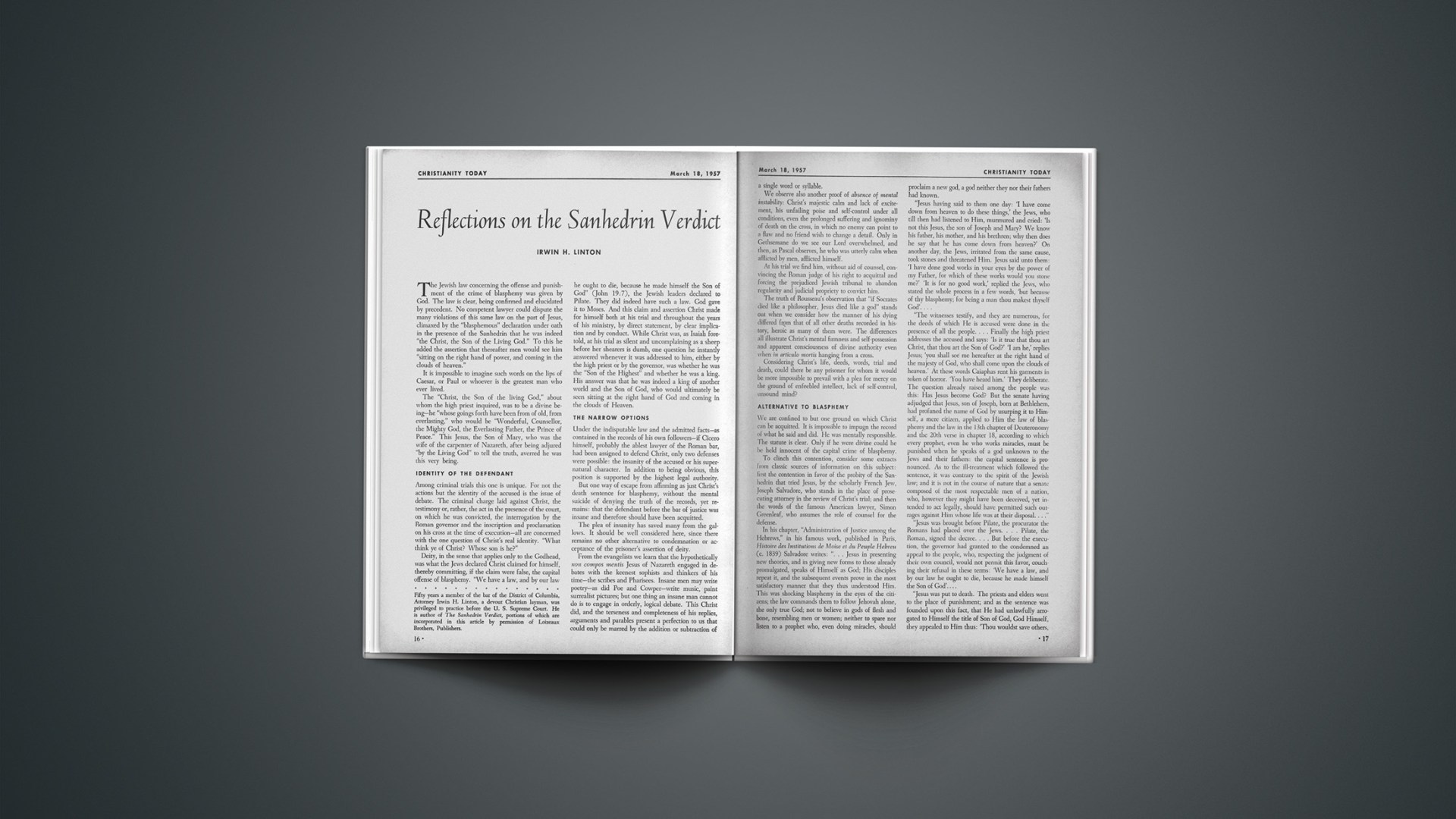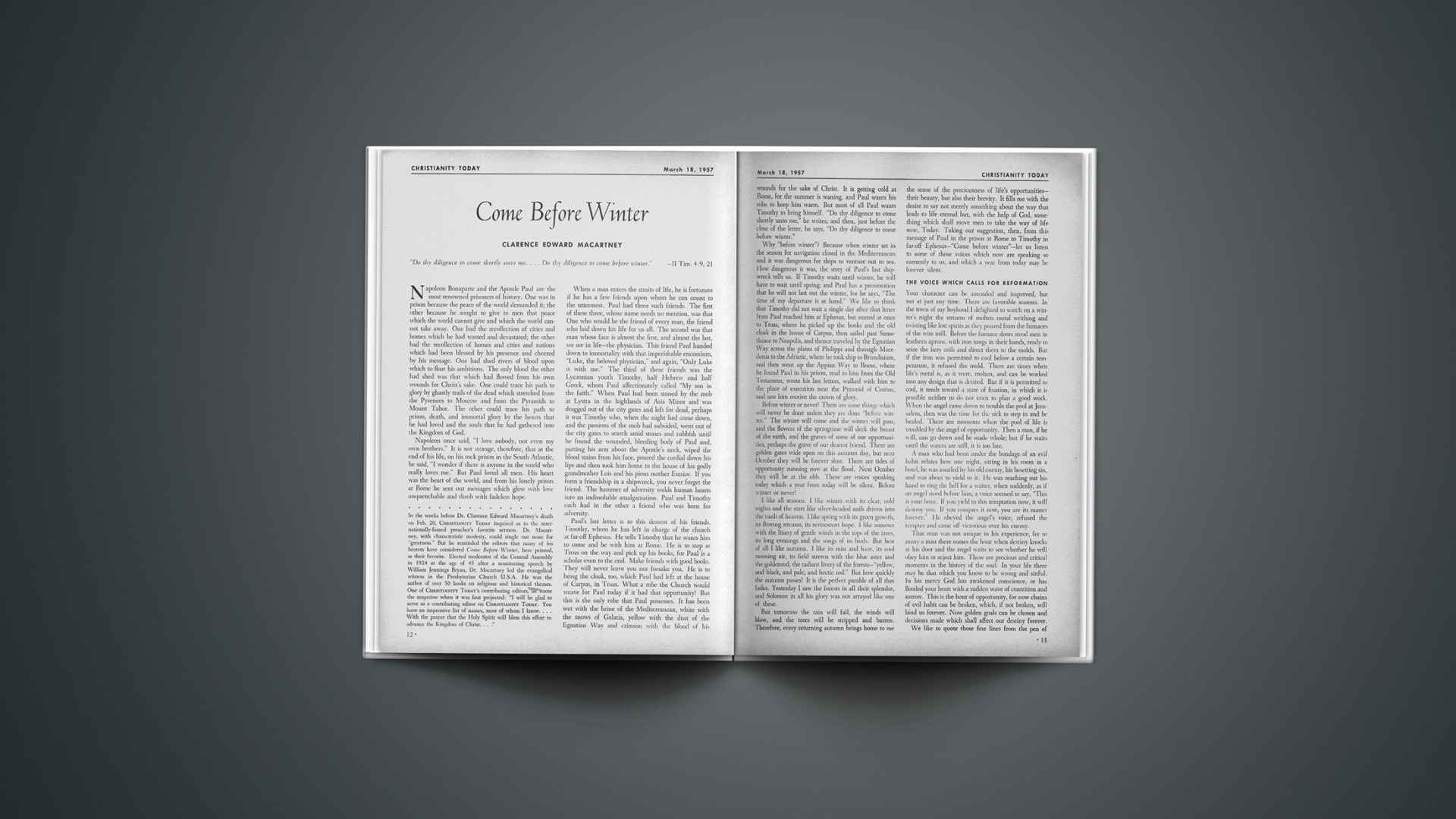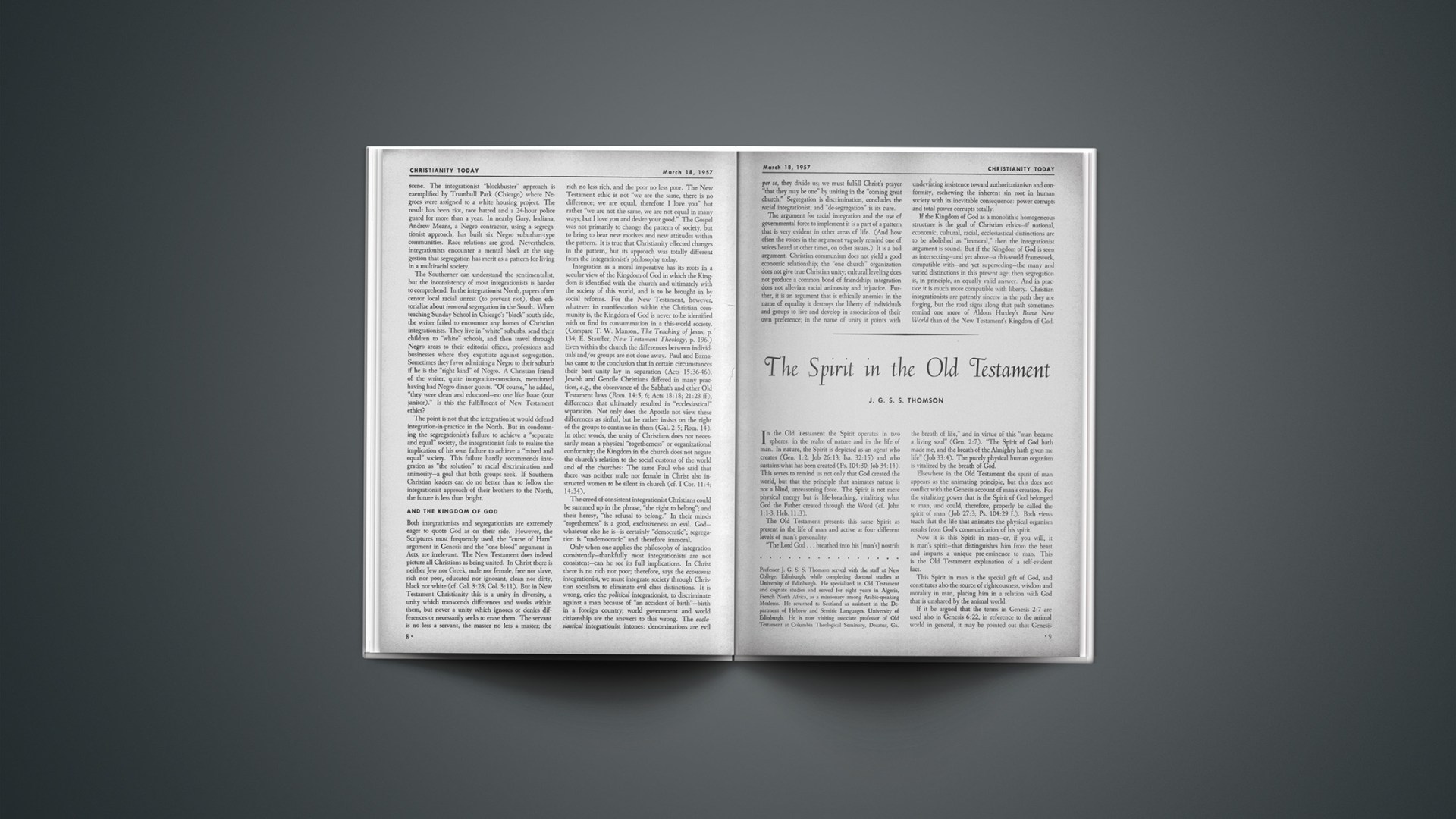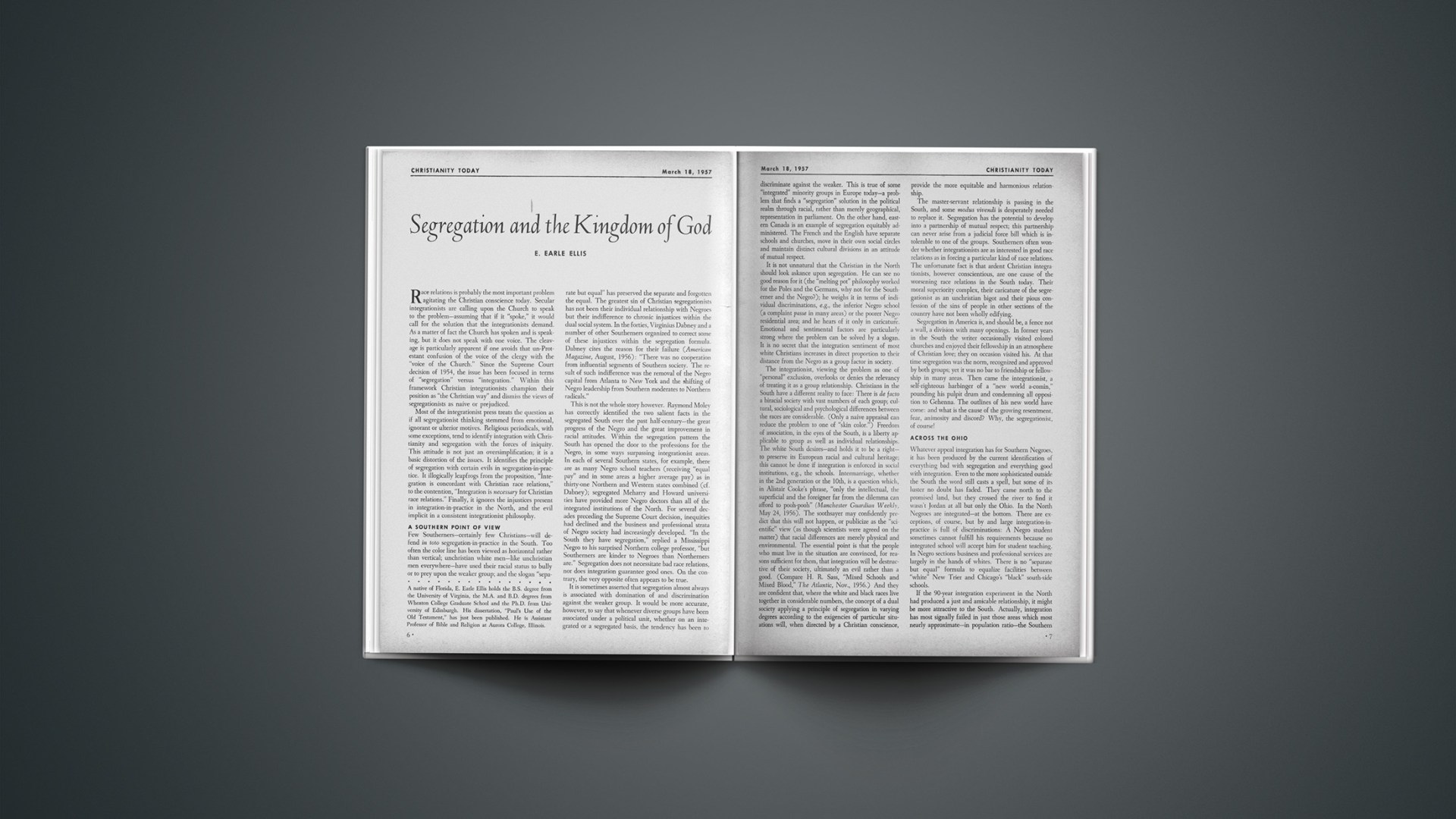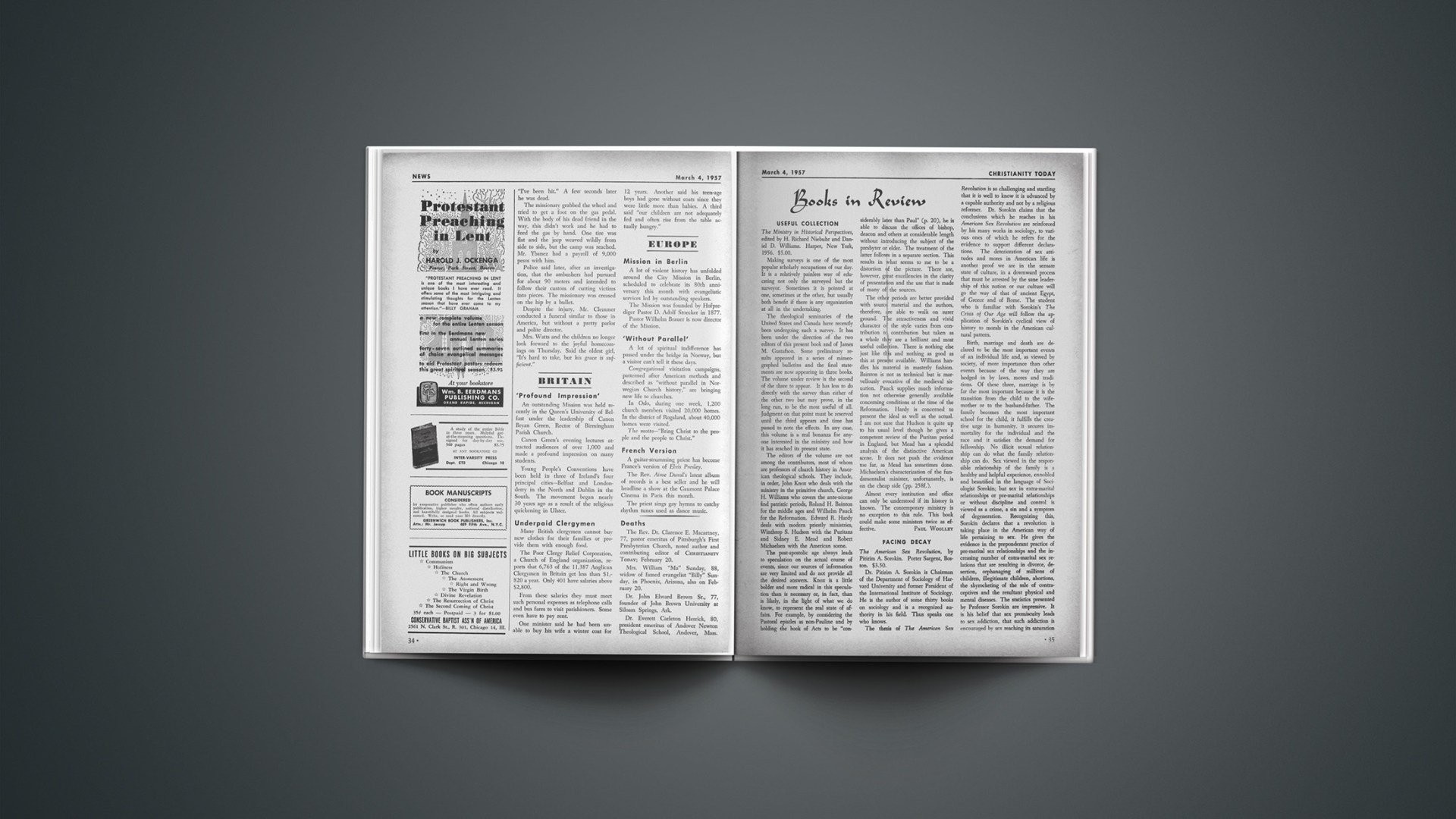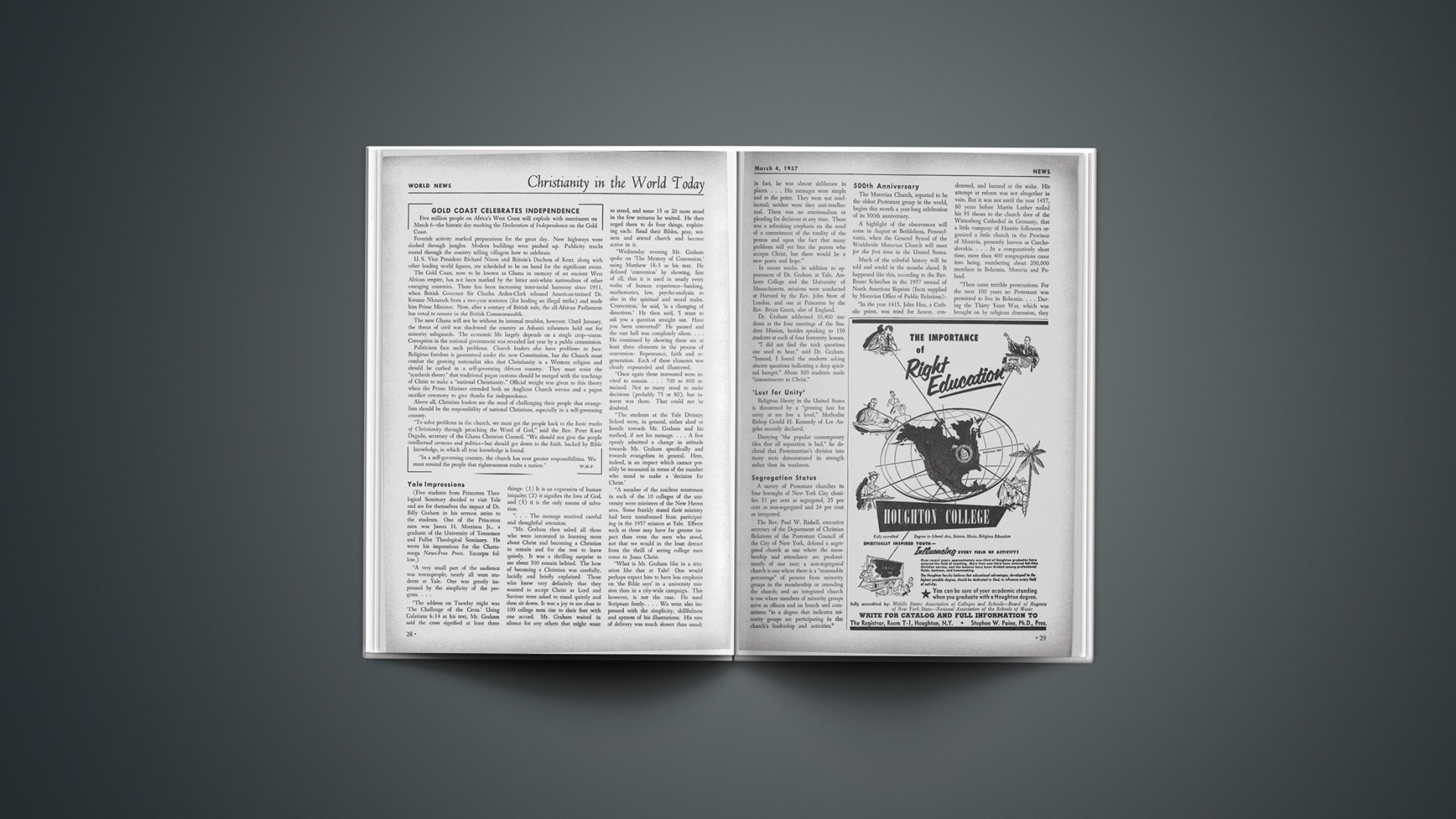The Jewish law concerning the offense and punishment of the crime of blasphemy was given by God. The law is clear, being confirmed and elucidated by precedent. No competent lawyer could dispute the many violations of this same law on the part of Jesus, climaxed by the “blasphemous” declaration under oath in the presence of the Sanhedrin that he was indeed “the Christ, the Son of the Living God.” To this he added the assertion that thereafter men would see him “sitting on the right hand of power, and coming in the clouds of heaven.”
It is impossible to imagine such words on the lips of Caesar, or Paul or whoever is the greatest man who ever lived.
The “Christ, the Son of the living God,” about whom the high priest inquired, was to be a divine being—he “whose goings forth have been from of old, from everlasting,” who would be “Wonderful, Counsellor, the Mighty God, the Everlasting Father, the Prince of Peace.” This Jesus, the Son of Mary, who was the wife of the carpenter of Nazareth, after being adjured “by the Living God” to tell the truth, averred he was this very being.
Identity Of The Defendant
Among criminal trials this one is unique. For not the actions but the identity of the accused is the issue of debate. The criminal charge laid against Christ, the testimony or, rather, the act in the presence of the court, on which he was convicted, the interrogation by the Roman governor and the inscription and proclamation on his cross at the time of execution—all are concerned with the one question of Christ’s real identity. “What think ye of Christ? Whose son is he?”
Deity, in the sense that applies only to the Godhead, was what the Jews declared Christ claimed for himself, thereby committing, if the claim were false, the capital offense of blasphemy. “We have a law, and by our law he ought to die, because he made himself the Son of God” (John 19:7), the Jewish leaders declared to Pilate. They did indeed have such a law. God gave it to Moses. And this claim and assertion Christ made for himself both at his trial and throughout the years of his ministry, by direct statement, by clear implication and by conduct. While Christ was, as Isaiah foretold, at his trial as silent and uncomplaining as a sheep before her shearers is dumb, one question he instantly answered whenever it was addressed to him, either by the high priest or by the governor, was whether he was the “Son of the Highest” and whether he was a king. His answer was that he was indeed a king of another world and the Son of God, who would ultimately be seen sitting at the right hand of God and coming in the clouds of Heaven.
The Narrow Options
Under the indisputable law and the admitted facts—as contained in the records of his own followers—if Cicero himself, probably the ablest lawyer of the Roman bar, had been assigned to defend Christ, only two defenses were possible: the insanity of the accused or his supernatural character. In addition to being obvious, this position is supported by the highest legal authority.
But one way of escape from affirming as just Christ’s death sentence for blasphemy, without the mental suicide of denying the truth of the records, yet remains: that the defendant before the bar of justice was insane and therefore should have been acquitted.
The plea of insanity has saved many from the gallows. It should be well considered here, since there remains no other alternative to condemnation or acceptance of the prisoner’s assertion of deity.
From the evangelists we learn that the hypothetically non compos mentis Jesus of Nazareth engaged in debates with the keenest sophists and thinkers of his time—the scribes and Pharisees. Insane men may write poetry—as did Poe and Cowper—write music, paint surrealist pictures; but one thing an insane man cannot do is to engage in orderly, logical debate. This Christ did, and the terseness and completeness of his replies, arguments and parables present a perfection to us that could only be marred by the addition or subtraction of a single word or syllable.
We observe also another proof of absence of mental instability: Christ’s majestic calm and lack of excitement, his unfailing poise and self-control under all conditions, even the prolonged suffering and ignominy of death on the cross, in which no enemy can point to a flaw and no friend wish to change a detail. Only in Gethsemane do we see our Lord overwhelmed, and then, as Pascal observes, he who was utterly calm when afflicted by men, afflicted himself.
At his trial we find him, without aid of counsel, convincing the Roman judge of his right to acquittal and forcing the prejudiced Jewish tribunal to abandon regularity and judicial propriety to convict him.
The truth of Rousseau’s observation that “if Socrates died like a philosopher, Jesus died like a god” stands out when we consider how the manner of his dying differed from that of all other deaths recorded in history, heroic as many of them were. The differences all illustrate Christ’s mental firmness and self-possession and apparent consciousness of divine authority even when in articulo mortis hanging from a cross.
Considering Christ’s life, deeds, words, trial and death, could there be any prisoner for whom it would be more impossible to prevail with a plea for mercy on the ground of enfeebled intellect, lack of self-control, unsound mind?
Alternative To Blasphemy
We are confined to but one ground on which Christ can be acquitted. It is impossible to impugn the record of what he said and did. He was mentally responsible. The statute is clear. Only if he were divine could he be held innocent of the capital crime of blasphemy.
To clinch this contention, consider some extracts from classic sources of information on this subject: first the contention in favor of the probity of the Sanhedrin that tried Jesus, by the scholarly French Jew, Joseph Salvadore, who stands in the place of prosecuting attorney in the review of Christ’s trial; and then the words of the famous American lawyer, Simon Greenleaf, who assumes the role of counsel for the defense.
In his chapter, “Administration of Justice among the Hebrews,” in his famous work, published in Paris, Histoire des Institutions de Moise et du Peuple Hebreu (c. 1839) Salvadore writes: “… Jesus in presenting new theories, and in giving new forms to those already promulgated, speaks of Himself as God; His disciples repeat it, and the subsequent events prove in the most satisfactory manner that they thus understood Him. This was shocking blasphemy in the eyes of the citizens; the law commands them to follow Jehovah alone, the only true God; not to believe in gods of flesh and bone, resembling men or women; neither to spare nor listen to a prophet who, even doing miracles, should proclaim a new god, a god neither they nor their fathers had known.
“Jesus having said to them one day: ‘I have come down from heaven to do these things,’ the Jews, who till then had listened to Him, murmured and cried: ‘Is not this Jesus, the son of Joseph and Mary? We know his father, his mother, and his brethren; why then does he say that he has come down from heaven?’ On another day, the Jews, irritated from the same cause, took stones and threatened Him. Jesus said unto them: ‘I have done good works in your eyes by the power of my Father, for which of these works would you stone me?’ ‘It is for no good work,’ replied the Jews, who stated the whole process in a few words, ‘but because of thy blasphemy; for being a man thou makest thyself God’.…
“The witnesses testify, and they are numerous, for the deeds of which He is accused were done in the presence of all the people.… Finally the high priest addresses the accused and says: ‘Is it true that thou art Christ, that thou art the Son of God?’ ‘I am he,’ replies Jesus; ‘you shall see me hereafter at the right hand of the majesty of God, who shall come upon the clouds of heaven.’ At these words Caiaphas rent his garments in token of horror. ‘You have heard him.’ They deliberate. The question already raised among the people was this: Has Jesus become God? But the senate having adjudged that Jesus, son of Joseph, born at Bethlehem, had profaned the name of God by usurping it to Himself, a mere citizen, applied to Him the law of blasphemy and the law in the 13th chapter of Deuteronomy and the 20th verse in chapter 18, according to which every prophet, even he who works miracles, must be punished when he speaks of a god unknown to the Jews and their fathers: the capital sentence is pronounced. As to the ill-treatment which followed the sentence, it was contrary to the spirit of the Jewish law; and it is not in the course of nature that a senate composed of the most respectable men of a nation, who, however they might have been deceived, yet intended to act legally, should have permitted such outrages against Him whose life was at their disposal.…”
“Jesus was brought before Pilate, the procurator the Romans had placed over the Jews.… Pilate, the Roman, signed the decree.… But before the execution, the governor had granted to the condemned an appeal to the people, who, respecting the judgment of their own council, would not permit this favor, couching their refusal in these terms: ‘We have a law, and by our law he ought to die, because he made himself the Son of God’.…
“Jesus was put to death. The priests and elders went to the place of punishment; and as the sentence was founded upon this fact, that He had unlawfully arrogated to Himself the title of Son of God, God Himself, they appealed to Him thus: ‘Thou wouldst save others, thyself thou canst not save. If thou are indeed the king of Israel, come down into the midst of us and we will believe in thee; since thou hast said, I am the Son of God, let that God who loves thee come now to thine aid.’ According to the Evangelists these words were a mockery; but the character of the persons who pronounced them, their dignity, their age, the order which they had observed in the trial, prove their good faith. Would not a miracle at this time have been decisive?”
Thus argues the learned Jewish scholar Joseph Salvadore, who shared the Modernist denial of Christ’s deity.
From A Famous American
And when we hear the counsel for the defense, for the accused Christ, Simon Greenleaf, we find he has no other defense to offer for Christ than his real deity:
“The death of Jesus is universally regarded among Christians as a cruel murder, perpetrated under the pretense of a legal sentence, after a trial in which the forms of law were essentially and grossly violated. The Jews to this day maintain that, whatever were the merits of the case, the trial was at least regular and the sentence legally just; that he was accused of blasphemy and convicted … by legal evidence.…
“It will now be necessary to consider more particularly the nature of the crime of blasphemy, in its larger signification, as it may be deduced from the law of God. That the spirit of this law requires from all men everywhere and at all times the profoundest veneration of the Supreme Being and the most submissive acknowledgment of him as their rightful Sovereign is too plain to require argument. If proof were wanted, it is abundantly furnished in the Decalogue, which is admitted among Christians to be of universal obligation.…
“… The law of blasphemy, as it was understood among the Jews, extended not only to the offence of impiously using the name of the Supreme Being, but to every usurpation of his authority or arrogation by a created being of the honor and power belonging to him alone.… And in such horror was it held by the Israelites that in token of it every one was obliged, by an early and universal custom, to rend his garments whenever it was committed or related in his presence.…”
The Record Is Clear
“Such being the general scope and spirit of the law, it would seem to have been easy to prove that Jesus had repeatedly incurred its penalties. He had performed many miracles but never in any other name than his own. In his own name, and without the recognition of any higher power, he had miraculously healed the sick, restored sight to the blind and strength to the lame, cast out devils, rebuked the winds, calmed the sea and raised the dead. In his own name, also, and with no allusion to the Omniscient, no ‘Thus saith the Lord, he had prophesied of things to come. He had by his own authority forgiven sins, and promised, by his own power, not only to raise the dead but to resume his own life after he should, as he predicted, be put to death. Finally, he had expressly claimed for himself a divine origin and character, and the power to judge both the quick and the dead. Considered as a man he had usurped the attributes of God.
“That he was not arrested at an earlier period is to be attributed to his great popularity and the astounding effect of his miracles. His whole career had been resplendent with his beneficence to the thousands who surrounded him. His eloquence surpassed all that had been uttered by man. The people were amazed, bewildered, fascinated by the resistless power of his life. It was not until his last triumphal visit to Jerusalem, after he had openly raised Lazarus from the dead, when the chief priests and elders perceived that ‘the world is gone after him,’ that they were stricken with dismay and apprehension for their safety and under this panic resolved upon the perilous measure of his destruction.…”
Preacher In The Red
PITY FOR THE POOR
As a country vicar I rarely visited London, and was quite unused to London ways. On a very memorable occasion I traveled to that city in clerical dress and used the underground railway. My ticket was checked and punched at the departure platform, and upon arrival at the terminal station I threw it away not realising that tickets would be collected. Much to my surprise, at the barrier an official asked me for my ticket. I explained that I had paid my fare, but had thrown my ticket away. “You will have to pay again,” was the prompt reply. “But really I have already paid,” I protested. I was just going to pay the money when from a queue that stood waiting a poorly dressed laborer stepped forward and said in a loud voice, “ow much is it, gov’ner?” “Four pence,” said the official. Then slamming four pennies on the counter, he said, “’ere y’are, gov’ner, let the poor beggar go.” It all happened in a flash, and in the presence of a number of waiting passengers. In my embarrassment I simply flew into the street and lost myself in the crowded station exit.—The Rev. ALBERT H. BROOMFIELD, Flintshields, Winterbourne-Houghton, Blandford, Dorset, England.
Irregularities Of Trial
“The only safe method in which this could be accomplished was under the sanction of a legal trial and sentence. Jesus, therefore, upon his apprehension was first brought before the great tribunal of the Sanhedrin, and charged with the crime of blasphemy.… Such was the estimation in which he was held that it was with great difficulty that witnesses could be found to testify against him; and the two who at last were procured testified falsely in applying his words to the temple of Solomon which he spake of the temple of his body.… But though the witnesses swore falsely in testifying that he spake of the Jewish temple, yet his words in either sense amounted to a claim of the power of working miracles and so brought him within the law.
“The high priest, however, still desirous of new evidence, which might justify his condemnation in the eyes of the people, proceeded to interrogate Jesus concerning his character and mission. ‘I adjure thee by the living God, that thou tell us whether thou be the Christ, the Son of God. Jesus saith unto him, Thou hast said: nevertheless I say unto you, Hereafter shall ye see the Son of man sitting on the right hand of power, and coming in the clouds of heaven. Then the high priest rent his clothes, saying, He hath spoken blasphemy; what further need have we of witnesses? behold, now ye have heard his blasphemy. What think ye? They answered and said, He is guilty of death.’ [Italics added.]
“We may suppose the multitude standing without the hall of judgment, able through its avenues and windows to see but not to hear all that was transacting within. It became important, therefore, to obtain some reason upon which the high priest might rend his clothes in their sight, thus giving to the people, by this expressive and awful sign, the highest evidence of blasphemy, uttered by Jesus in the presence of that august assembly. This act turned the tide of popular indignation against him, whose name but a short time before had been the theme of their loudest hosannas.…
“If we regard Jesus simply as a Jewish citizen, and with no higher character, this conviction seems substantially right in point of law, though the trial were not legal in all its forms. For whether the accusation were founded on the first or second commands in the Decalogue, or on the law laid down in the thirteenth chapter of Deuteronomy, or on that in the eighteenth chapter and twentieth verse, he had VIOLATED THEM ALL by assuming to himself powers belonging alone to Jehovah. And even if he were recognized as a prophet of the Lord, he was still obnoxious to punishment under the decision in the case of Moses and Aaron, before cited.
“It is not easy to perceive on what ground His conduct could have been defended before any tribunal unless upon that of his superhuman character. No lawyer, it is conceived, would think of placing His defence upon any other basis.”
Is it not utterly clear that there is no intermediate position between confession of Christ’s deity and confirmation of the Sanhedrin’s condemnation and execution of him as a blasphemer? It is equally clear that the matter of Christ’s deity and identity is not a mere “moot question.” The logical and almost inevitable result of denying full deity to him is to abandon the whole doctrine and transaction of atonement. The divine identity and deity, the atoning death, the bodily resurrection—all stand or fall together. That God should himself die to atone for his creatures’ sins against himself is a conception too presumptuous for human origin; to refuse this atonement is the one sin too presumptuous for divine forgiveness.
Who will begrudge fealty and honor to a Sovereign who shed his blood, who gave his life for his people—one so gentle that little children nestled in his arms; so mighty that he cast out with a word a myriad of demons, stopped a storm and wrested Lazarus from the claws of the great dragon, death; one who called the wicked rulers at Jerusalem a generation of vipers, but who, writing in the dust, was too courteous to look into the shamed eyes of the woman taken in adultery, whom he cleared with a sentence without impugning one iota of the law?
Shall we not hasten, while the divine “proclamation of amnesty” is still unrevoked, to swear our allegiance to the coming Prince of Glory?
Fifty years a member of the bar of the District of Columbia, Attorney Irwin H. Linton, a devout Christian layman, was privileged to practice before the U. S. Supreme Court. He is author of The Sanhedrin Verdict, portions of which are incorporated in this article by permission of Loizeaux Brothers, Publishers.

